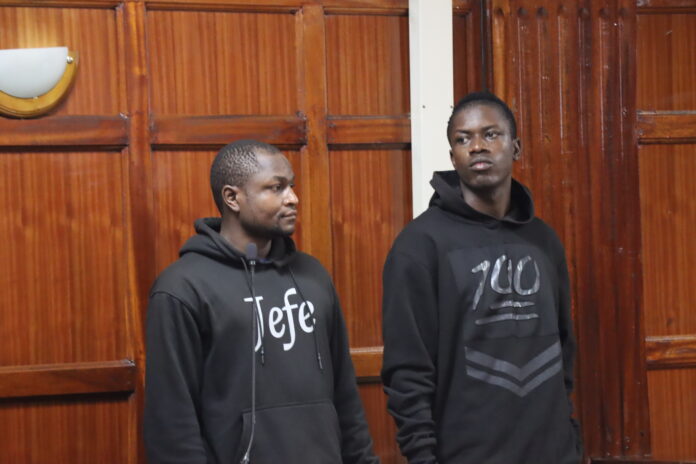Nairobi, May 21, 2025 — Tensions flared at the Milimani Law Court as the prosecution sought a seven-day extension of custodial orders for Felix Ochieng and Rudor Majoni, the main suspects in the brutal murder of Wilberforce Kisiani, citing concerns that the accused may interfere with crucial evidence and intimidate potential witnesses.
The suspects, who were arrested on May 5 and arraigned on May 7, have been in custody for 14 days without the completion of a key investigative step—an identification parade. The defense team blasted the delay, asserting that the prosecution’s application for an extension was not being pursued in good faith.
“This is a blatant violation of our clients’ rights. They have been held for two weeks without an ID parade. What exactly is the State waiting for?” one of the defense lawyers challenged in court. “If the prosecution truly had confidence in their evidence, why the continued delays?”
The Office of the Director of Public Prosecutions, in a memo dated May 20, emphasized the need for further investigation before any formal charges can proceed. The memo outlined gaps in the probe, including unrecorded statements from key witnesses, missing CCTV footage from the night of the incident, and a compromised crime scene. The DPP’s office also raised concerns over tampered digital evidence and the delay in retrieving critical forensic data from DVR machines and mobile devices.
According to witness statements, the deceased was assaulted and dragged into Room 25 at the VVIP Classic Club in Nairobi’s River Road on the night of May 4. The body of Wilberforce Kisiani was later discovered by a supervisor the next morning, lying unresponsive on the floor. Post-mortem results revealed multiple head injuries caused by blunt force trauma.
The prosecution now argues that given the complexity of the case—including the need to trace numerous club employees, analyze deleted CCTV data, and verify forensic evidence—extended detention is justified to preserve the integrity of the investigation. They further claim that the suspects, who were part of the club’s bouncer team, are in a position to interfere with witnesses, many of whom remain unidentified or uncooperative.
However, the defense maintains that holding suspects without conducting the ID parade—one of the most basic identification procedures—is a violation of due process. “The State is fishing,” the defense counsel argued. “You cannot keep someone in custody indefinitely on the mere suspicion that they might interfere with evidence.”
As the matter continues to unfold, the court is now tasked with balancing the need for a thorough investigation against the fundamental rights of the accused. The court found the application by the prosecution merited and the same was allowed, the respondents will remain in police custody for a further period of five days
By Kelly Were.



















